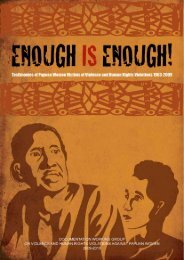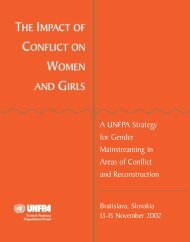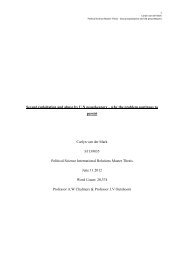IANSA [PDF, 2MB] - PeaceWomen
IANSA [PDF, 2MB] - PeaceWomen
IANSA [PDF, 2MB] - PeaceWomen
Create successful ePaper yourself
Turn your PDF publications into a flip-book with our unique Google optimized e-Paper software.
1. Country<br />
Snapshot:<br />
and if they do, most go to their own family members,<br />
friends, and the family members of the abuser for<br />
intervention and support. Very few seek help from<br />
public institutions such as the police, courts, or social<br />
services. 11 Women and girls who speak out are often<br />
blamed for the violence inflicted upon them, and their<br />
families are shamed for not exerting greater control<br />
over their sexuality. 12<br />
These issues will be further explored in the following<br />
chapters on Lebanon, Jordan and Occupied<br />
Palestinian Territory. Considering the scope of the<br />
issues, the following report does not attempt to be<br />
comprehensive and gives only succinct background<br />
information about each country situation.<br />
Lebanon<br />
■ Context<br />
“The front door of Abu Rida’s cramped workshop<br />
bursts open and three young men enter, one of them<br />
hopping on one foot because of a bullet wound.<br />
Minutes earlier, they had been involved in a gun battle<br />
with a rival gang in a nearby district. They ask Abu<br />
Rida for ammunition for their pistols, including a<br />
Russian Tokarev automatic.” 13<br />
This excerpt from a May 2011 article in Time<br />
Magazine, describing a scene in a Beirut gun shop,<br />
highlights the age and gender dimensions of gun violence<br />
and the demand for small arms in Lebanon.<br />
their communities. 37.5% respondents possessed at<br />
least one weapon. Of these, 22% possessed more<br />
than three guns. “Guns have so much become part<br />
of the societal culture that people do not feel that<br />
holding weapons is either a crime or a dangerous<br />
choice. The culture of violence and war (…) is still<br />
rooted in the subconscious of many Lebanese people.”<br />
Focus group participants agreed that “all kinds<br />
of small arms can be found in Lebanese society”<br />
explaining their proliferation by Lebanon’s history and<br />
the lack of SALW collection efforts. 16 In 2011,<br />
women’s organisations reported that disarmament<br />
efforts had been incomplete.<br />
Guns: cheap, widely available and part<br />
of every day life<br />
The rate of private gun ownership in Lebanon is estimated<br />
at 21.0 firearms per 100 people. 14 Interviews<br />
reveal that most households possess at least one<br />
firearm, whatever the religion, denomination or social<br />
status of the individual. Lebanon shares with its<br />
neighbours the view that possession of arms represents<br />
manhood. In the region of Ba’albek and Mount<br />
Lebanon, Lebanese people still exclaim, “We have<br />
increased by one gun” when a baby boy is born.<br />
Sometimes a rifle is given to a baby boy as a gift at<br />
birth. Lebanese law legitimises the carrying and trading<br />
of arms, under the legislative decree No. 137<br />
issued in 1959. Furthermore, Lebanese authorities<br />
issue licenses very easily. 15<br />
In a survey conducted in 2005 with youth aged 20-35<br />
by the Permanent Peace Movement, 90.6% of<br />
respondents felt that there are a lot of weapons in<br />
“In Lebanon, as every house has guns, it’s<br />
not a priority policy issue. There is a license<br />
system, but people can get licenses very<br />
easily. The disarmament process after the<br />
war was incomplete and did not include<br />
everyone.” – Interview, YWCA-Beirut,<br />
March 2011<br />
The Syrian context and recent upsurge<br />
in the proliferation of small arms<br />
Regional politics have a big influence on the demand<br />
for SALW in Lebanon. Demand has been growing<br />
steadily over the past months with the influx of Syrian<br />
refugees. Several reports point to a recent “arms selling<br />
frenzy” as black-market arms dealers in Lebanon<br />
find themselves overwhelmed by Syrians looking<br />
either to protect their families, or to shoot back at the<br />
security forces sent to squash the rebellion against<br />
8 9


![IANSA [PDF, 2MB] - PeaceWomen](https://img.yumpu.com/25206379/5/500x640/iansa-pdf-2mb-peacewomen.jpg)

![Commitments Sample [PDF, 93KB] - PeaceWomen](https://img.yumpu.com/25206331/1/190x245/commitments-sample-pdf-93kb-peacewomen.jpg?quality=85)











![A Toolkit for Advocacy and Action [PDF, 260KB] - Peace Women](https://img.yumpu.com/25205989/1/190x245/a-toolkit-for-advocacy-and-action-pdf-260kb-peace-women.jpg?quality=85)